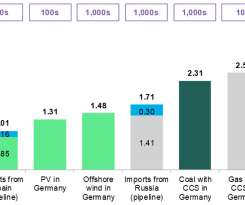Eni report: global oil reserves and oil production up in 2018 due to US
Green Car Congress
JULY 30, 2019
Eni has released the 18 th edition of the World Oil, Gas and Renewables Review , the annual statistics report on oil, natural gas and renewables sources. The first volume of the report, the World Oil Review, is devoted to oil reserves, supply, demand, trade and prices with a special focus on crude oil quality and on refining industry.



















Let's personalize your content